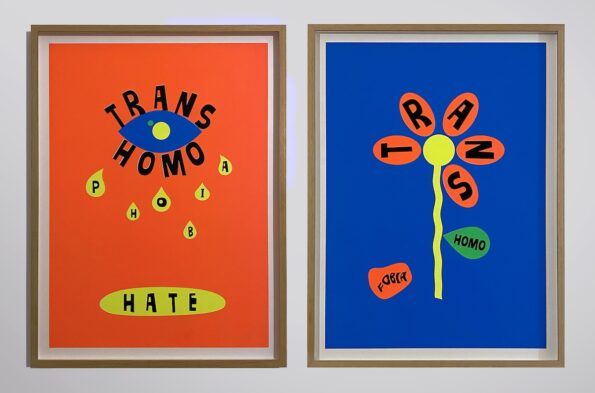Search
To search for an exact match, type the word or phrase you want in quotation marks.
A*DESK has been offering since 2002 contents about criticism and contemporary art. A*DESK has become consolidated thanks to all those who have believed in the project, all those who have followed us, debating, participating and collaborating. Many people have collaborated with A*DESK, and continue to do so. Their efforts, knowledge and belief in the project are what make it grow internationally. At A*DESK we have also generated work for over one hundred professionals in culture, from small collaborations with reviews and classes, to more prolonged and intense collaborations.
At A*DESK we believe in the need for free and universal access to culture and knowledge. We want to carry on being independent, remaining open to more ideas and opinions. If you believe in A*DESK, we need your backing to be able to continue. You can now participate in the project by supporting it. You can choose how much you want to contribute to the project.
You can decide how much you want to bring to the project.

It is March 2017 and Carla takes advantage of a press frenzy to talk about the pamphlet from the organization Hazte Oír, an ultra-conservative lobby dedicated to what we call “information influence,” financing itself through masked charitable donations and focused on making headlines through media controversy and hate campaigns. They are the ones from the infamous van that toured the country promoting transphobic messages. Later, they began to challenge feminist discourse in the face of gender violence by exploiting the hashtag feminazi and a photo of Hitler wearing makeup in a pink uniform. In 2022, they paraded around again with another slogan against the reform of the Trans Law and against non-binary children. Its tentacles enter and embrace the Vox party (although as separate powers so they never stain the party too much and can push it with greater autonomy), but it also knows how to bring together the American heirs of the morals and maxims of Anita Bryant with the Russian ultra-Orthodox friends of Putin, the ultra-Catholic Mexican paramilitary sects with blessings from Rouco Varela, the Teocon neo-Nazis and the resurrectionists of the old regime. That day Carla couldn’t take it anymore and got directly to the point:
I would like to ask a question, but first I’m going to show you a photograph of the pamphlets of this campaign with two children giving the fascist salute to an LGTBI flag. You’ve all seen them. Last night I couldn’t get over my surprise and I wanted to check the original sources. The two children were portrayed during the Spanish Civil War giving a fascist salute to a photo of Franco. This is the original picture; this is the image that this shameful ideology of hate campaign has used to attack our dignity. And so I wonder: Why do they insult us? Why do they disrespect us? Beneath the LGBTI flag, the colors of freedom, they are covering our greatest executioner, the one who put us in jail.
The pamphlets were distributed in schools and as a supplement in different newspapers. Hiding our worst enemy within our colors, this irrevocable example of childhood indoctrination distorts history by pairing its own fascist emblems with our symbols in order to trivialize and discredit our discourse, but above all, to create controversy and pain.
This pain is very difficult to encompass in all its magnitude in terms of empathy on the part of people who have represented themselves as cisgender throughout their lives.
At the end of this past summer we witnessed some unfortunate statements by the musical creator and singer Róisín Murphy, former leader of Moloko, the one who sang:
Sing it back to me (sing it)
Bring it back (sing it)
Sing it back (sing it)
Bring it back
Sing it back to me
On her personal Facebook page, she responded to a post from one of her contacts: Puberty blockers are fucked, this is absolutely heartbreaking, Big Pharma is laughing all the way to the bank. Confused children are vulnerable and need to be protected, that’s a fact. Please don’t call me TERF, stop using that word against women. Hours later, a screenshot of her comment went viral.
The reaction from the LGBTQ+ community on social networks was immediate. McKenzie Wark responded to a comment from a user/fan scandalized by the singer’s words: This is disappointing. Artists who have queer fans but make no effort to understand or empathize with them. You’ve seen it all before.
Or the opinion of Ariel Zetina, who after a public statement made by the singer to undo the damage after her comments were disseminated on a large scale, commented: Puberty blockers have saved many trans kids and the de-transition rates are very low!!!!! I wish there was a phrase here that encouraged trans people. I hate to see this because the LGBT community is the pillar of your fanbase!!
Roisin Murphy didn’t soften her words about that something that had nothing to do with her. An apology that was certainly not a change of opinion and in which she reaffirmed her disguised anti-trans position. I would like to be a diva, but I have masculine body language, she commented in an interview after the release of her latest album, barely a couple of months ago.
Sing it back, yes, but when that is not part of your life, open the door so that others can bring it back.
The future is non-binary because non-binary identity, in addition to being an intimate and vital personal representation, is a collective strategy to undo gender violence and the violence that gender implies. Non-binary is a declaration of rupture with a system of inherited gender. Declaring oneself non-binary means declaring war on the old expectations of an economic, linguistic, social and emotional system that leaves practically all of us navigating in a kind of nostalgic collective delirium of a primitive adaptation system, with codes that are much more post-Fordian, authoritarian, and neoliberal and an enslavement of nature, very, very far from the survival instinct. Non-binary is an opportunity to rethink desire and sexuality, which still feels like a shadow of hetero reproduction even in bi, trans and homo sexualities. Non-binary does not necessarily imply a renunciation of privileges, and it can certainly be used as a merely discursive, or exotic, element. But it can also be something else. When non-binary is exercised for an incendiary purpose (everyone depending on their own body knows how to do it), it generates rupture in its wake. This can be exhausting, and it certainly is, and that is why we appeal to an intergenerational call for young people to spread their enthusiasm to the elderly, and vice versa in terms of wisdom. This project will not be enough, however, if it is only a union of affection and symbolic exchange. Only by sharing a network of power, resources, shelter and occupation will we be creating a true non-binary revolution.
This may sound utopian, but it is a revolution already underway. The pharmaceutical industry is more powerful than ever, and we are very far from having a network of psychologists and endocrinologists trained in trans and queer sensitivity, but we cannot put the exceptions in the crosshairs of the rule and decenter the axis of the problem. This cannot be a reason to deny or stop the first step to emancipation, that is, gender self-determination, especially for trans people, as well as a social system that guarantees their security and autonomy.
When we talk about politics of representation we are not only talking about identity, references and codes, we are also talking about life, its management and everything that surrounds and affects it.
The writing of this text has been affected (as if by a violent blow of an axe) by the loss of Danielle Gallegos, better known as Aérea Negrot[1]https://artishockrevista.com/2023/10/18/aerea-negrot-cuerpos-queer-venezolanos/. Danielle, who was the sister and godmother of all locas, made frivolity her politics and a flag with which to break down social conventions, like a code with which the barrier of camp is separated from good taste, an alternative channel for creativity from which to question everything.
She’s not exactly the first one to leave this life too soon. Whether due to depression, other more complex cases of mental health or from errors in the health system (often due to lack of knowledge or lack of reaction), all of these are the final causes of a problem that began much earlier, in a society that can’t assimilate the realities outside the inherited system.
Even today there is still confusion (and cases of conscious violence) in the use of trans people’s pronouns by people who manage culture. The non-binary issue remains poorly understood and is far from being assimilated into legislation. We continue without realistic and three-dimensional representation, constantly questioned bureaucratically, relegated to precarious jobs and far from the consensus of so many cis juries.
If it were not for our sense of responsibility inside and outside the collective, for the political statement as a personal and shared biography, for creativity and fiction as formats of emancipation and a surface where we are reflected emotionally, and above all, for our affection and support networks, the level of violence would be unbearable. Sometimes, as in Dani’s case, even with the most solid community, pain can be transformed into overwhelming sadness. No more martyrs! We cannot wait for generational change. Only if we are part of the conversation can we begin a horizontal and sincere transformation.

El Palomar is an artistic collective founded in 2013 and formed by Ama Sánchez (Campillos, Málaga, 1980) and R. Marcos Mota (Tarragona, 1988), with the premise of bringing together a cultural panorama with equal rights and opportunities for all those who are part of sexual and gender dissidence. It is a pioneering project on an international level, born out of self-determination and self-management with a view to institutional collaboration, with a horizontal pedagogical will and collective empowerment. Their practice explores different languages and disciplines, and hybridises artistic production and curating. In their work, they are committed to processes that challenge culture in terms of form and content, that take into account their social scene and propose points of access and empathy to the public.
They have received awards such as the Miquel Casablancas Prize and the Ojo Crítico prize for the visual arts. Their recent work includes the curatorial project El gran grito (at the Kunsthaus Baselland), the work Schreber is a Woman (originally presented at the 11th Berlin Biennale, at the KW, and later at MACBA, the Leslie-Lohman Museum in New York, the Franfkurten Kunstwerein, the NS-Dokuzentrum München and La Térmica), and There must be justice, where they hybridise production and curatorship.
Portrait © Komposit Studio
"A desk is a dangerous place from which to watch the world" (John Le Carré)